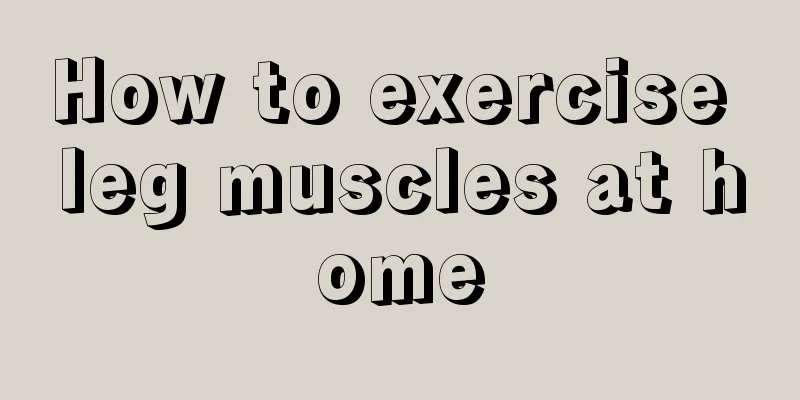Constipation after diarrhea

|
Many people will experience constipation after experiencing diarrhea, which will make them feel very uncomfortable and affect their physical condition. Therefore, if you feel constipated, you must go to the hospital to find out the cause of the disease so that targeted treatment can be taken to improve the condition. Some patients suffer from constipation due to eating habits. (I) Functional constipation 1. Eating less or the food lacks fiber or water, which reduces the stimulation to colon movement. 2. Normal bowel habits are disrupted due to work stress, fast pace of life, changes in work nature and time, and mental factors. 3. Colonic motility disorder: common in irritable bowel syndrome, caused by spasm of the colon and sigmoid colon. Some patients may experience alternating constipation and diarrhea. 4. Insufficient tension in the abdominal and pelvic muscles leads to insufficient force for defecation, making it difficult to expel feces from the body. 5. Abuse of laxatives leads to drug dependence, causing constipation; the elderly are weak, lack of activity, intestinal spasms leading to difficulty in defecation; the colon is long. (ii) Organic constipation 1. Rectal and anal lesions cause anal sphincter spasm and defecation pain, resulting in fear of defecation, such as hemorrhoids, anal fissures, perianal abscesses and ulcers, proctitis, etc. 2. Local lesions lead to weak defecation: such as large amounts of ascites, diaphragm paralysis, systemic sclerosis, muscular dystrophy, etc. 3. Complete or incomplete colon obstruction: benign or malignant colon tumors, Crohn's disease, and congenital megacolon. Intestinal adhesion, intestinal torsion, intussusception, etc. caused by various reasons. 4. Compression by tumors in the abdominal or pelvic cavity (such as uterine fibroids). 5. Systemic diseases cause intestinal muscle relaxation and weak defecation, such as uremia, diabetes, hypothyroidism, cerebrovascular accident, paraplegia, multiple sclerosis, dermatomyositis, etc. In addition, porphyria and lead poisoning can cause intestinal muscle spasms and lead to constipation. 6. The use of morphine-like drugs, anticholine drugs, calcium channel blockers, nerve blockers, sedatives, antidepressants, and antacids containing calcium and aluminum can relax intestinal muscles and cause constipation. [1] Hemorrhoids, anal fissures, perianal abscesses, ulcers, proctitis, massive ascites, diaphragmatic paralysis, systemic sclerosis, muscular dystrophy, benign and malignant colon tumors, Crohn's disease, congenital megacolon, intestinal adhesions, intestinal torsion, intussusception, uremia, diabetes, hypothyroidism, cerebrovascular accident, paraplegia, multiple sclerosis, and dermatomyositis. |
<<: What to use to ripen bananas
>>: Why do bananas help with bowel movements
Recommend
Knee ligament sprain with effusion, you need to know how to deal with it
After a ligament sprain, you must go to an orthop...
Can a pregnant woman live in a newly renovated house one year ago?
Anyone with a little common sense knows that if t...
What are the foods high in selenium?
Selenium is an indispensable trace element in the...
What are the symptoms of androgenic alopecia? How to solve it?
Hair loss is a common phenomenon in recent years,...
What are the symptoms of early cardiac cancer?
Cardiac cancer is a highly harmful disease. Its o...
Symptoms of advanced lung cancer
The physical condition of patients with advanced ...
Can people with bladder cancer eat mutton
Bladder cancer patients should eat foods rich in ...
The efficacy of orange peel pillow
Nowadays, people's insomnia is becoming more ...
What's the matter with normal glycosylated hemoglobin and high fasting blood sugar?
Many diabetic patients will see changes in their ...
What are the functions and effects of windproof
Saposhnikovia divaricata can achieve relatively g...
What medicine can cure cough quickly
Colds, fevers, and coughs are the three most comm...
What are the effects of powder plus salvia powder
Salvia miltiorrhiza powder actually has a very go...
X-ray is an important method for examining bone tumors
X-ray examination of bone tumors can provide valu...
Is medication effective for intestinal spasms?
Intestinal spasm is a disease that is very easy t...
What are the main symptoms of testicular cancer
The male reproductive system is very complex, and...









